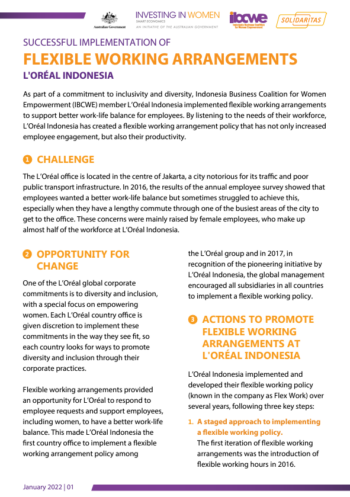Case Study: Flexible Working Arrangements at L’Oréal Indonesia
Summary
L’Oréal Indonesia, a member of the Indonesia Business Coalition for Women Empowerment (IBCWE), has pioneered flexible working arrangements to foster a better work-life balance and enhance productivity. Starting in 2016, L’Oréal Indonesia responded to employees’ desires for more adaptable work schedules by introducing flexible working hours and, subsequently, remote working options. The policy allows employees to tailor their work schedules and environments, acknowledging the challenges of commuting in Jakarta and supporting particularly female employees who form a significant part of the workforce. By 2021, this initiative evolved into a comprehensive Flex Work policy, incorporating remote work days and a flexible benefits budget for all employees. The successful implementation of these policies not only increased employee satisfaction but also maintained productivity levels during the COVID-19 pandemic, demonstrating the adaptability and resilience of the workforce.
Highlights
- L’Oréal Indonesia was the first within the global L’Oréal group to implement a flexible working arrangement policy, setting a precedent for other subsidiaries.
- The policy includes flexible working hours, a remote working quota, and a benefits budget, responding effectively to the diverse needs of the workforce.
- Employee surveys indicate high satisfaction with the Flex Work arrangement, citing improved work-life balance and productivity as key outcomes.
- The flexibility provided by the policy proved instrumental in quickly adapting to the full-time remote work requirements during the COVID-19 pandemic.
- L’Oréal plans to continue evolving its flexible working practices with a hybrid model, balancing in-office and remote work to optimize collaboration and productivity.


